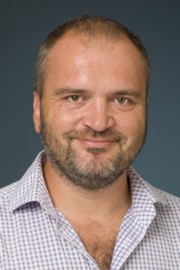Evaluative Clinical Sciences
SRI platforms

Scientist
Sunnybrook Health Sciences Centre
2075 Bayview Ave., Room M1 102
Toronto, ON
M4N 3M5
Education:
- B.Sc. (Hons), 1996, physiology, University of Toronto, Canada
- M.Sc., 1999, zoology, U of T
- PhD, 2003, neuroscience, U of T
Appointments and Affiliations:
- Scientist, Evaluative Clinical Sciences, Hurvitz Brain Sciences Research Program, Sunnybrook Research Institute
- Assistant professor, department of otolaryngology – head and neck surgery, U of T
- Research director, Sunnybrook Cochlear Implant Program
Research Foci:
- Hearing and speech perception
- Cochlear implants
- Electrophysiology
- Brain imaging
- Tinnitus
- Aging
- Cognition
Research Summary:
Dr. Dimitrijevic’s lab studies the physiology of human hearing in both normal hearing and hearing impaired populations. They use electroencephalograms, also known as EEG or “brain waves,” to understand the neural mechanisms of how sound is processed and perceived.
A major focus of the lab is cochlear implants. The cochlear implant is a modern-day medical miracle. It allows people who are deaf to regain hearing by stimulating the auditory nerve and creating neural impulses that reach the brain and lead to sound perception. People with cochlear implants may hear well in quiet settings but experience difficulties in everyday listening environments, such as following a conversation during a cocktail party. The goal of this research is to understand better the brain mechanisms of hearing with a cochlear implant and use this knowledge to improve outcomes after cochlear implantation.
The lab also studies sensory and cognitive factors related to hearing. Hearing is both a peripheral (ear) and cognitive (brain) process. The cognitive aspects of hearing, such as attention and memory, become crucial when listening in noisy environments. This is especially true for older people or those with hearing impairment. Therefore another focus of the lab is to study the neural mechanisms associated with attention and working memory. The goal of this research is to dissociate sensory and cognitive aspects of impaired hearing and provide clinicians with improved tools and strategies for rehabilitation.
Selected Publications:
See current publications list at PubMed.
- Dimitrijevic A, Smith ML, Kadis DS, Moore DR. Cortical Alpha Oscillations Predict Speech Intelligibility. Front Hum Neurosci. 2017 Feb;11:88.
- Han JH, Zhang F, Kadis DS, Houston LM, Samy RN, Smith ML, Dimitrijevic A. Auditory cortical activity to different voice onset times in cochlear implant users. Clin Neurophysiol. 2016 Feb;127(2):1603–17.
- Han JH, Dimitrijevic A. Acoustic change responses to amplitude modulation: a method to quantify cortical temporal processing and hemispheric asymmetry. Front Neurosci. 2015 Feb 11;9:38.
- Wynne DP, Zeng FG, Bhatt S, Michalewski HJ, Dimitrijevic A, Starr A. Loudness adaptation accompanying ribbon synapse and auditory nerve disorders. Brain. 2013 May;136(Pt 5):1626–38.
- Dimitrijevic A, Starr A, Bhatt S, Michalewski HJ, Zeng FG, Pratt H. Auditory cortical N100 in pre- and post-synaptic auditory neuropathy to frequency or intensity changes of continuous tones. Clin Neurophysiol. 2011 Mar;122(3):594–604.
- Dimitrijevic A, John MS, Picton TW. Auditory steady-state responses and word recognition scores in normal-hearing and hearing-impaired adults. Ear Hear. 2004 Feb;25(1):68–84.
Related News and Stories:
- Reaping the rewards of persistence: Summer student gains research opportunity to help the hearing impaired (July 24, 2017)
-
CV: Dr. Andrew Dimitrijevic: A closer look (July 6, 2017)
Related Links:


